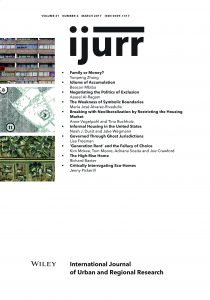David Harvey’s notion of ‘accumulation by dispossession’ has inspired a wide range of studies in different places. But it has hardly registered in the area of urban land grabbing in Africa and what the role of local capital has been in these processes. In this article, I use archival data, field observations and insights from key informant interviews in Harare to examine how the 1990s neoliberalism and the post-1999 Zimbabwe crisis created new opportunities for accumulation of wealth through the irregular and fraudulent transfer of public urban land into private hands, including those of reputable corporate institutions. I provide a summary of the literature on contemporary land grabbing, raising questions about and providing new insights for a comparative understanding of the transformative role and nature of the state, postcolonial African cities, anti-capitalist struggles, and the status and meaning of planning in different settings.

